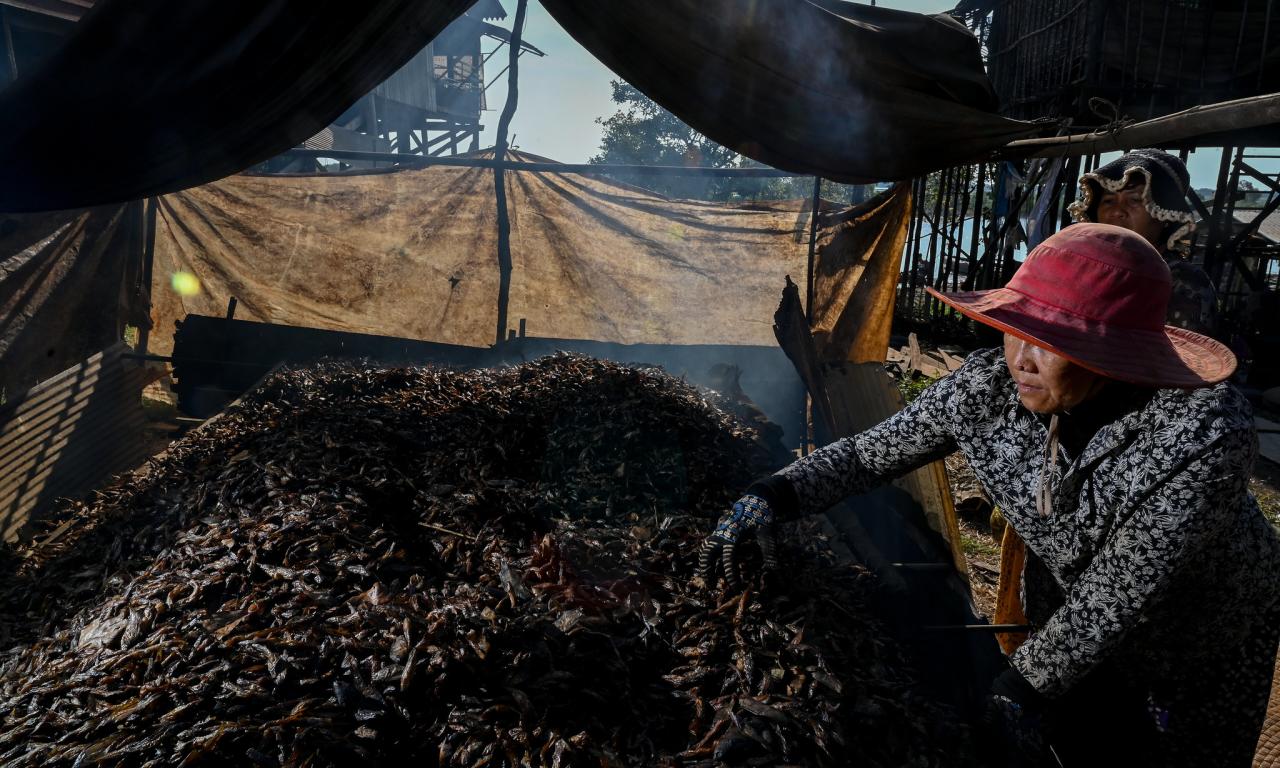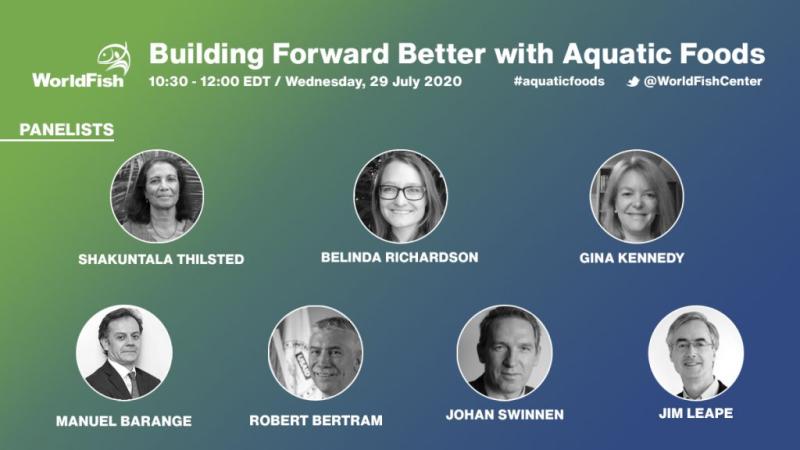
The role of aquatic foods in COVID-19 recovery and the sustainable food system transformation demands more attention in global research agendas, said a panel of high-level agriculture for development experts at a virtual dialogue, hosted by WorldFish on 29 July.
With the COVID-19 economic crisis estimated to increase the global number of undernourished by at least 14.4 million to over 80 million as well as adding another 70 million living in extreme poverty, six panelists from research and funding agencies highlighted the potential of aquatic food systems in recovery efforts at the Virtual Dialogue: Building Forward Better with Aquatic Foods.
The pandemic has revealed major weaknesses, inequities and system-wide risks in global food systems. The panelists were joined by over 500 audience participants from government, academia, public and private sectors to discuss the renewed urgency to foster innovative pathways to greater food system sustainability and resilience, and increase investment in scientific research and development.

Aquatic foods through fisheries, aquaculture and related value chains are central to the nutrition and livelihoods of up to 800 million people globally, particularly those in developing countries vulnerable to climate change, poverty, conflict and humanitarian emergencies. The COVID-19 economic crisis has impacted aquatic food systems severely exacerbating efforts to improve livelihoods and food and nutrition security.
Aquatic foods, animals and plants harvested from water, are important to national food and economic systems. Stabilization of their production and marketing chains needs to be a priority as part of COVID-19 adaptation and recovery, said Robert Bertram, Chief Scientist at the USAID Bureau for Resilience and Food Security.
“The shock has impacted employment and decreased incomes and effective demand from low-income, vulnerable households, while simultaneously disrupting supply chains, especially for highly nutritious and perishable foods like fish. Together these make aquatic foods less available and less affordable,” he said.
No longer can aquatic food research be sidelined in agriculture for development agendas. Harnessing aquatic food and value chain research now is a forward-looking investment in inclusive food, nutrition, economic and environmental health, explained Bertram.
Aquatic foods through fisheries, aquaculture and related value chains are central to the nutrition and livelihoods of up to 800 million people globally, particularly those in developing countries vulnerable to climate change, poverty, conflict and humanitarian emergencies. The COVID-19 economic crisis has impacted aquatic food systems severely exacerbating efforts to improve livelihoods and food and nutrition security.
Aquatic foods, animals and plants harvested from water, are important to national food and economic systems. Stabilization of their production and marketing chains needs to be a priority as part of COVID-19 adaptation and recovery, said Robert Bertram, Chief Scientist at the USAID Bureau for Resilience and Food Security.
“The shock has impacted employment and decreased incomes and effective demand from low-income, vulnerable households, while simultaneously disrupting supply chains, especially for highly nutritious and perishable foods like fish. Together these make aquatic foods less available and less affordable,” he said.
No longer can aquatic food research be sidelined in agriculture for development agendas. Harnessing aquatic food and value chain research now is a forward-looking investment in inclusive food, nutrition, economic and environmental health, explained Bertram.
Aquatic foods crucial to building forward better in response to COVID-19
Identifying weaknesses in aquatic food systems must be used as research, policy and investment opportunities to build forward better in response to COVID-19 to ensure resilience to future shocks, said the United States agriculture for development lead.
Research and innovation must be targeted at food value chains, which have struggled under COVID-19 disruptions. Building inclusive aquatic food value chains now is the foundation for achieving the Sustainable Development Goals, said Manuel Barange, Director of Fisheries and Aquaculture Policy and Resources Division at Food and Agriculture Organization of the United Nations (FAO).
“We need to protect supply chains, innovate our fish to fork systems to allow for more automation, digitization, using traceability tools to facilitate trade. And we need to support dependent communities, including incentivizing the entry of the youth in the sector, and empowering women, the hidden part of the sector. Remember that without social sustainability the sustainability stool does not hold,” he said.
The COVID-19 pandemic challenges us to become more creative and resourceful in order to shift policy and investment to achieve our global targets, said Gina Kennedy, the Director of Food Systems with USAID’s Advancing Nutrition, during the discussion.
A particular worry for panelists is the consumption shift toward unhealthy processed foods in response to inaccessibility of fresh nutritious foods due to COVID-19. They called for consumers to be protected against lasting damage to their health through efforts to promote the availability and accessibility of nutrient-rich aquatic foods.
Currently there is little data on the contribution of aquatic foods to nutritious diets in developing countries. Urgent research is needed to uncover to inform policy that improves their availability, Kennedy explained. She also pointed that exploring the diversity of aquatic foods is as critical to keeping populations healthy and boosting immune systems.

Boosting aquatic food research as part of global food systems transformation
In recent years, one assessment after another has concluded that to nourish a population set to reach 10 billion people by 2050 while sustaining the Earth’s natural systems, the world will increasingly need to rely on food produced in ocean and freshwater fisheries and aquaculture, said Jim Leape, Co-Director of the Center for Ocean Solutions at Stanford University.
“We can’t continue to neglect the role of aquatic foods in the food system. They already play a vital role in many parts of the world, and that will only grow,” he said. “We must identify, review, and fill important gaps in our understanding of the role of aquatic foods in global food systems now and in the future to inform and propel change in policies and practices that will shape decisions which impact the future of food.”
“Evidence tells us that aquatic foods are considered among the most climate-friendly, in part because they are efficient. And these efficiencies in terms of feed conversion -- comparing very favorably with terrestrial livestock, nutrient density, carbon footprint and sustainability are all places where science, technology and sound policy can make a difference, now and going forward,” USAID Chief Scientist Bertram added.
There has been a historical underinvestment in these areas of research because traditionally, the agricultural research agenda has been largely focused on land-based food production systems, said Johan Swinnen, the Director-General of IFPRI. Along with other panelists Swinnen called for building a holistic agricultural research agenda that pays greater attention to linkages between land and water food production systems.
Strong partnerships are key to explore and materialize the potential of aquatic food systems to relieve pressure on land-based food production systems, and enable healthier and sustainable diets, he said.

Innovative partnerships to develop and scale aquatic food research
COVID-19 response offers an opportunity to reimagine a new way of working together across the public and private sectors, and to ensure that good policy and investment decisions are guided and informed by robust scientific evidence, said Belinda Richardson, Agricultural Development Project Officer at the Bill & Melinda Gates Foundation.
Private and public sector together can play a vital role in harnessing aquatic foods innovation to improve economic, food and nutrition security for the world’s poorest. The regulatory environment must enable the private sector to scale research and innovations that reach small-scale producers and low-income consumers, she explained.
To build better forward with aquatic foods, we need to mobilize a global movement – that brings together the research community, government, donors, the private sector and consumers - to co-create and implement evidence-based solutions of shared value, and which aquatic foods an integral part of the global call to action for a sustainable food systems transformation for healthy people and planet, said Shakuntala Thilsted, member of the UN High-level Panel of Experts on Food Security and Nutrition and WorldFish Global Leader on Nutrition and Value Chains in her closing remarks.
The group of international, interdisciplinary speakers and audience participants represented the crucial network needed to harness the potential of aquatic foods to drive effective COVID-19 recovery and sustainable food systems transformation, said WorldFish Director-General Gareth Johnstone.
Related posts:
Video Virtual Dialogue: Building Forward Better with Aquatic Foods,
WorldFish Response to Coronavirus,
Prioritizing aquatic food systems key to global food, nutrition security, say panellists at Virtual Ocean Dialogues
Related publications:
The State of the World Fisheries and Aquaculture 2020, UNFAO
Summary of the impacts of the COVID-19 pandemic on the fisheries and aquaculture sector, UNFAO
Food Security and Nutrition Building a Global Narrative Towards 2030, Committee on World Food Security High Level Panel of Experts
Blue Foods Assessment by Stanford Center for Ocean Solutions, Stockholm Resilience Center, EAT Forum, WorldFish, and others
EAT scoping report: The role of seafood in sustainable and healthy diets
HLP Blue paper: The future of food from the sea
HLP Blue paper: Towards ocean equity
WorldFish paper: Prospects and challenges of fish for food security in Africa
WorldFish paper: Fish to 2050 in the ASEAN region
WorldFish paper: Harnessing global fisheries to tackle micronutrient deficiencies (explore video abstract)
